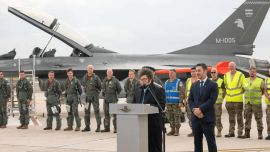Embattled state-owned airline Aerolíneas Argentina will suffer its fourth strike this month on Monday, when 371 flights will be grounded affecting more than 40,000 clients, according to official estimates. The firm said yesterday it would suspend all flights for 24 hours in the wake of the decision from unions.
The strike is part of a broader conflict between unions and the federal government, as inflation and a crippling recession eats at workers’ purchasing power, while the Mauricio Macri administration battles a deep fiscal deficit with austerity. Adding to the government’s woes, the INDEC national statistics bureau said yesterday the economy shrank by 5.8 percent in September, year-on-year.
“It’s just not fair that the 95 percent who don’t travel have to pay for Aerolíneas Argentinas,” President Macri said earlier in November, in the aftermath of the second general strike at Argentina’s flagship airline.
A group of five unions – which include pilots, ground personnel, technical and professional employees of Aerolíneas Argentinas called for the strike in response to the suspension this week of 367 workers who were sanctioned for “abandoning their work stations or withholding their labour” – a reference to assemblies that lead to the cancellation of 258 flights in a strike on November 8.
“Our decision was directly tied to the chaos they generated,” explained Aerolíneas Argentinas President Luis Malvido in a radio interview with Radio Mitre this week. “What we did was to sanction [our employees] in direct proportion to the damage they caused our passengers.”
The suspensions will last 10 to 15 days, telegrams received by workers read.
The conflict is tied to Argentina’s collective wage negotiations, through which Aerolineas Argentinas’ employees have already secured a 34-percent increase year-todate, Malvido argued.
While the unions argue that September’s record 6.5 percent monthly inflation rate should trigger a further automatic increase this year, the company claims it should count toward next year’s increases.
“This company is virtually in bankruptcy,” Malvido said, “in order to pay salaries each month we are forced to ask the state for money.”
Earlier this year, Transport Minister Guillermo Dietrich said Aerolineas Argentinas would stop receiving subsidies by 2020, according to government estimates. According to his figures, in 2011 the implicit subsidy per ticket sold reached US$130, but had fallen to US$14 by early 2018. By October, Malvido — who in August replaced Mario Dell’Aqua at the helm — was rejecting Dietrich’s figures, indicating the state would probably have to sink more than the US$180 million it paid in 2017 to keep the company going as a consequence of rising crude oil prices and a sharp drop in international travel due to the pesodollar devaluation.






















Comments